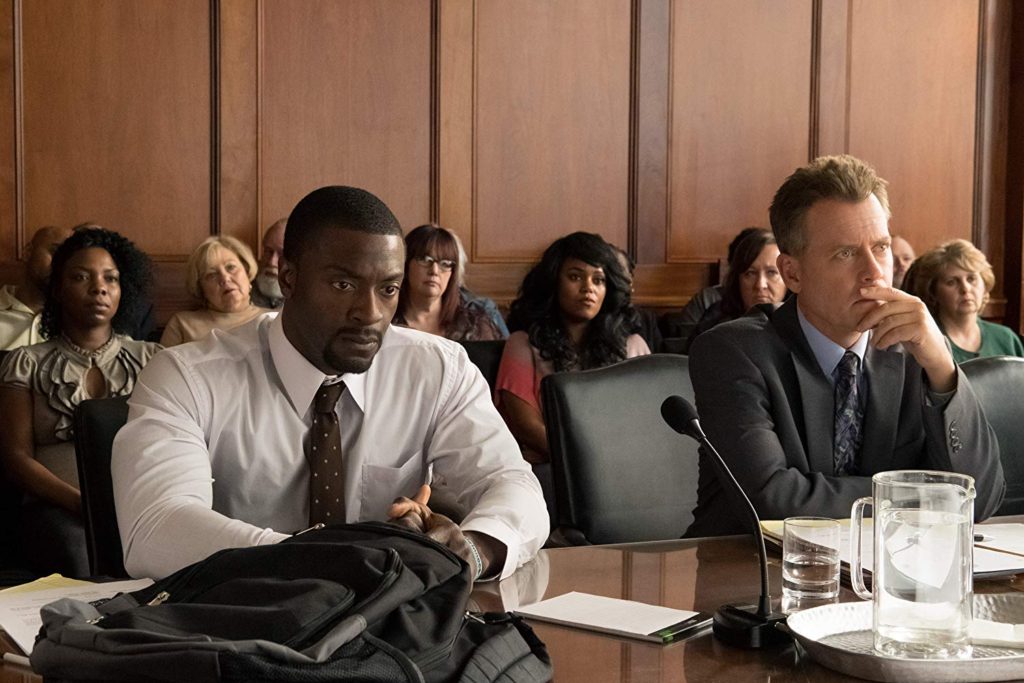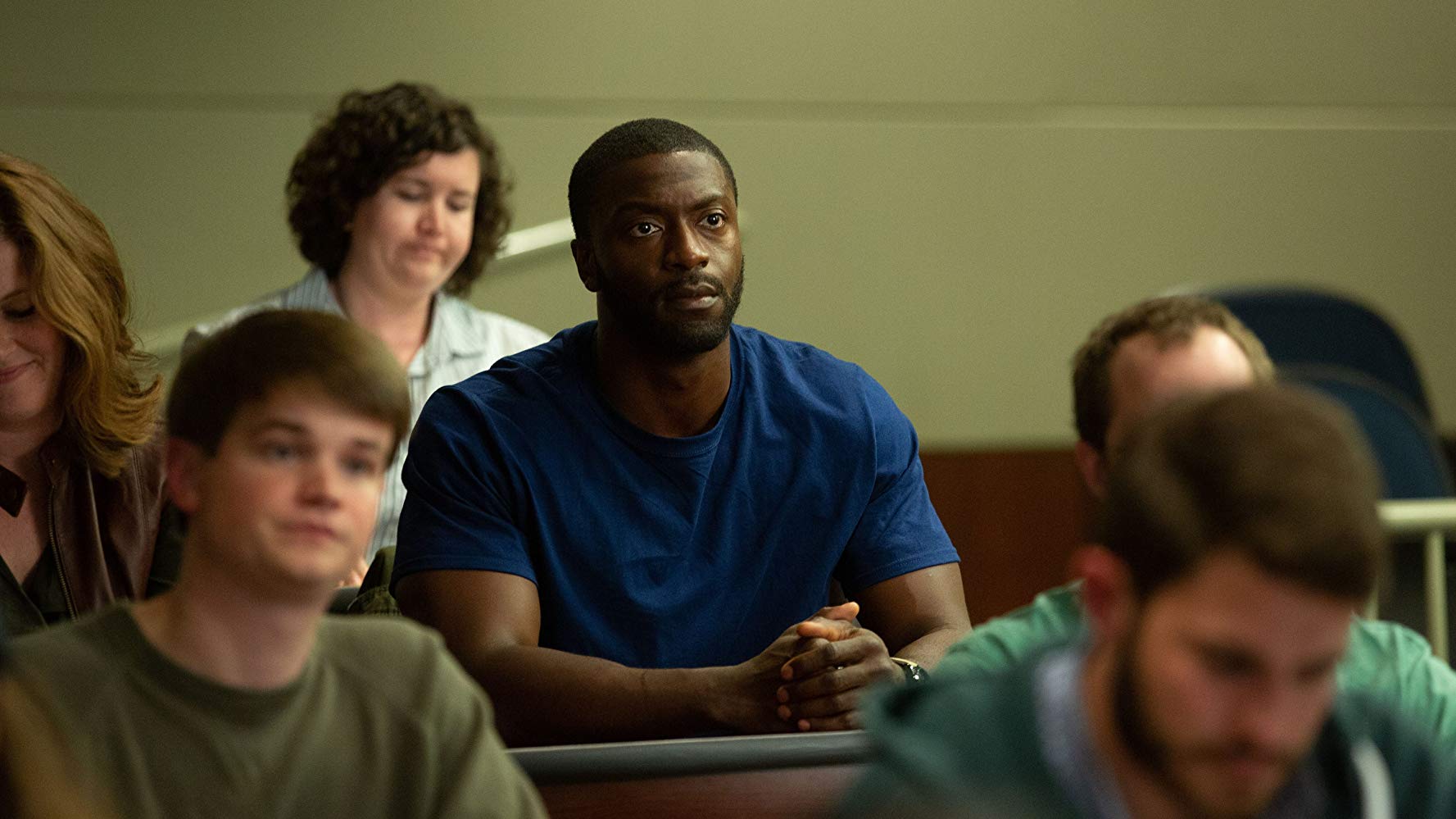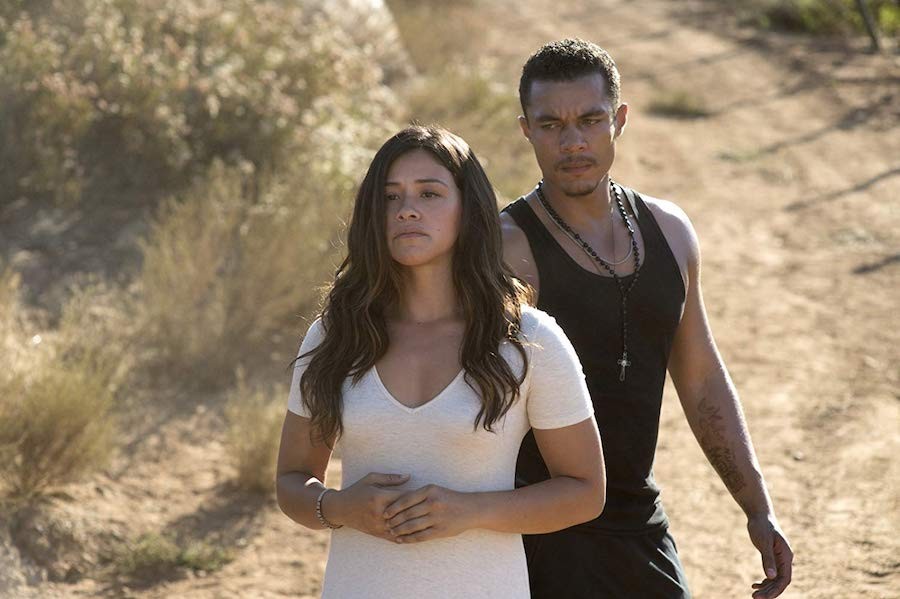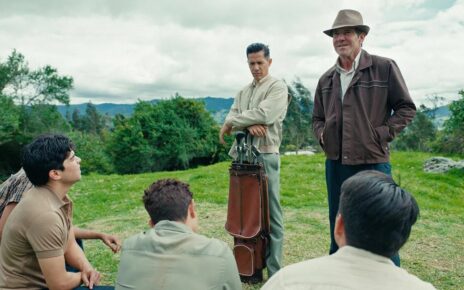On the one hand, I want to love this film. A formerly imprisoned innocent man trying to put his life together? It’s like The Shawshank Redemption, Part II (which, come to think of it, would make a terrible movie). On the other hand, the film states front-and-center that the story of Brian Banks is tragic not necessarily because the system f***ed him (it did), but because a woman didn’t f*** him and then did f*** him. Thus, the film sadly pits two groups (innocents in prison and women who have been raped) against one another. Both groups deserve better; you’ve all been wronged.
Brian Banks (Aldis Hodge) was a junior at Long Beach Poly when he signed a letter of intent to attend [read: play football for] USC upon graduating high school. That never happened. Instead, Brian was accused of kidnap/rape, threatened with 41 (?!) years in prison, took a plea bargain that his lawyer claimed would mean zero jail time, ended up instead serving six years with an extra five of probation.
The probation is a killer because it’s still impossible to piece your life back together regardless of the debt you’ve paid. For instance, Brian’s restraining order insists he cannot come within 2000 feet of a public park. Imagine you’re in Manhattan – how are you supposed to get anywhere north from anywhere south without coming within 2,000 feet of Central Park? I guess you’re swimming to the Bronx, pal. Enjoy the Hudson. Don’t get me started on any job application that includes the question “have you ever been convicted of a felony?” I feel sorry for men who are 100% guilty and they deserve every bit of punishment they had coming to them. Brian is 0% guilty.
The film is told almost entirely from the perspective of Brian Banks tragedy plus ten years, where high school Brian has long since been replaced by sentenced/jailed/paroled/hounded-by-his-parole-officer Brian. Out of desperation, Brian starts grabbing the attention of Justin Brooks (Greg Kinnear), the head of the California Innocence Project. Justin is (rightfully) reluctant to take the case as 1) Brian is free; there are bigger fish to fry and 2) California sucks at overturning decisions, and Brian’s case –a “he said/she said” rape—would need a recanting ten years after the fact by a woman who stood to lose the $1.5 M award settlement from the school district in the wake of the original conviction.
All right. I’ve stated the facts, now let’s examine this case and this movie – do note how difficult it is to achieve any semblance of success following such an accusation. Why an American man credibly accused of rape in 2019 can only hope to rise as far as President or Supreme Court Justice*. I looked up the wiki on Brian Banks because the facts as presented didn’t make much sense to me. Let me state straight off I believe Banks. Played nobly by Aldis Hodge, Brian is a poster child for never giving up on your dreams. And the film seemed to get the facts right. That said … 41 years? For a first offense? As a teen? What am I missing? And how could the film display the accuser as such a flake? In the film, she clearly has no idea the consequences of her actions even a decade later which, in turn, perpetuates the ugly and very mistaken belief that women who cry rape are often liars.
I want to know more about the incident from high school. Was Brian Banks a celebrity or not? The letter of intent to USC and the $1.5M would suggest yes, but this is the 21st Century United States: any celebrity’s rape accuser must endure a gauntlet of trolls. This has nothing to do with the veracity of the accusation and everything to do with our national love of celebrity. Once Brian Banks became a nationally coveted recruit, he became a celebrity, and there’s zero chance this Swiss Cheese accusation from Flaky McRapewhistle would have lasted five minutes in an open forum, much less in a courtroom. The film wants it both ways – it wants us to feel for the immense scope of what Brian Banks lost while pretending he had more than a baby’s chance in dingo country of living an otherwise average life.
I hate that there are innocent people in prison; I hate that people who are raped are subject to such scrutiny that the crime oft goes unreported – but if you ask me which the greater problem of the two is, it’s the latter, by far. No question. The amount of unreported rapes is an exponential increase v. the number of innocents imprisoned. The greatest problems of American justice rarely revolve around the incarceration of an innocent – the ratio of innocents to guilty in US prisons is roughly the same as the ratio of legitimate scientific studies showing climate change doesn’t exit to those that do. The greatest problem with the American prison system is a failure to level the societal playing field thus creating far more criminals among the demographically disadvantaged and the uneven sentencing for identical crimes between two members of differing demographics. Project Innocence is a noble pursuit, but a red herring among the problems we ought to be solving. Hence, this film is a noble but sadly misleading soapbox rant.
“Justice is imbalanced,” we report
Certain types should avoid open court
If you’re not terribly bright
Or not exactly white
Better hope you play a professional sport
Rated PG-13, 99 Minutes
Director: Tom Shadyac
Writer: Doug Atchison
Genre: Awful v Awful, not unlike the NFL itself
Type of being most likely to enjoy this film: Justice hounds with a hint of misogyny
Type of being least likely to enjoy this film: Anyone who has ever feared that their rape claim would not be believed
*So long as they’re white, of course.




